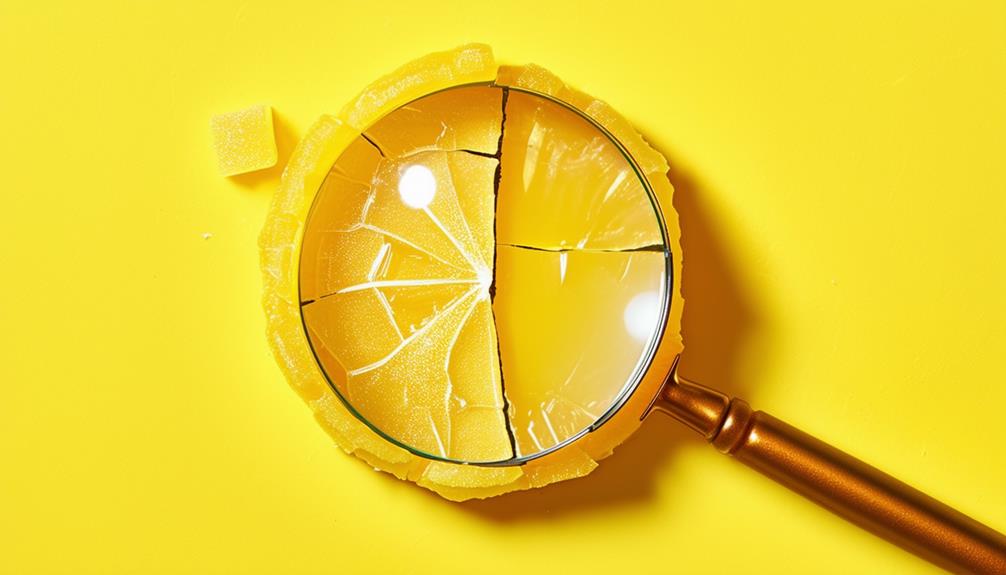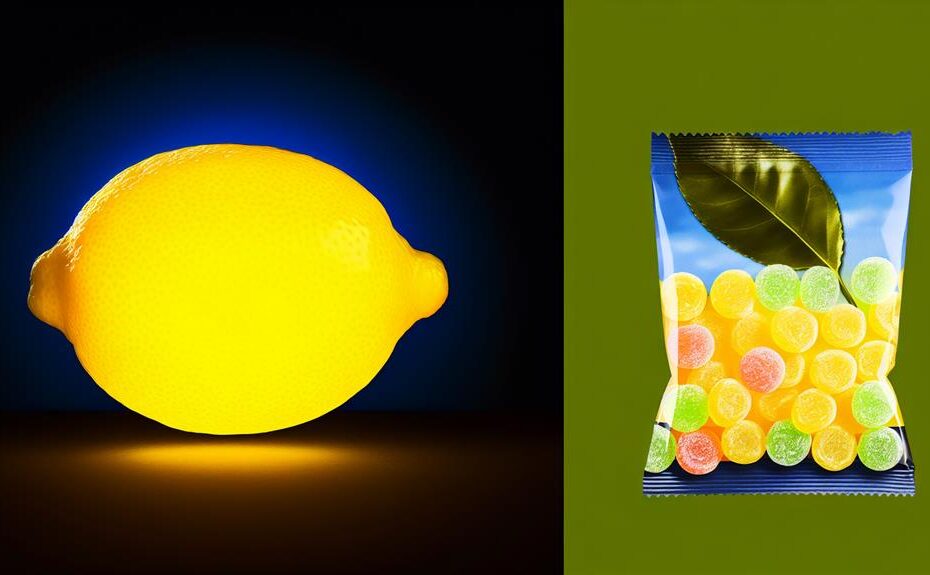As you unwrap a Lemonhead, you might assume it's a harmless, tart treat, but vegan concerns lurk beneath the surface. You might be surprised to find that these chewy candies may not align with your dietary preferences. The culprit? Potential non-vegan ingredients like gelatin in the coating and beeswax in the shell. But that's not all – Confectioner's Glaze and other additives could further compromise Lemonheads' vegan status. You're probably wondering what this means for your snacking habits. Let's take a closer look at the ingredients that might be hiding in your favorite sour candies.
Lemonheads' Sweet and Sour Roots
Since 1962, Ferrara Candy Company has been masterfully crafting Lemonheads, a tangy and sweet candy that has become a staple in many households. You might be wondering what makes Lemonheads so special.
The answer lies in their unique sweet and sour combination, which appeals to both sweet and sour candy enthusiasts. The secret to their tangy flavor? Real lemon juice, which gives Lemonheads an authentic citrus taste. As a result, Lemonheads have become a beloved candy that's hard to resist.
Whether you're a fan of the original hard candy, twists, or tubs, there's a Lemonhead variety to suit your taste buds. But are Lemonheads vegan? That's a question we'll investigate later. For now, let's just appreciate the sweet and sour roots of this iconic candy.
With their signature lemon flavor and varied textures, it's no wonder Lemonheads have remained a fan favorite for over 50 years.
Sugar Coating Concerns
When examining the sugar coating on Lemonheads, you'll want to explore the flavor profile options and the core sweeteners used.
You might be surprised to learn that the sugar coating can impact the overall vegan status of the candy.
Let's take a closer look at the ingredients and uncover the truth behind Lemonheads' sweet treats.
Lemonhead Flavor Profile Options
As you navigate the world of Lemonheads, you might be curious about what other flavor options are out there. You're in luck! The classic Lemonhead flavor profile has expanded to include some exciting and tangy variations.
Let's take a closer look at some of the most intriguing options:
- Sour Apple Flavor Option: a sweet and sour twist on the classic lemon flavor
- Lemon-Grapefruit Fusion Option: a zesty blend of citrus flavors that will tantalize your taste buds
- Lemon-Ginger Zing Option: a spicy kick that adds a new dimension to the traditional Lemonhead taste
Sour Apple Flavor Option
You'll appreciate the Sour Apple flavor option, which adds a tangy twist to the classic Lemonheads candy, but it also raises questions about the sugar coating's impact on dietary preferences.
As you indulge in the Sour Apple Lemonheads, you'll experience a tangy and sweet taste sensation.
However, if you're vegan, you might wonder if the sugar coating aligns with your dietary choices.
Lemon-Grapefruit Fusion Option
One notable new member of the Lemonheads family is the Lemon-Grapefruit Fusion option, which cleverly blends the tartness of lemon with the sweetness of grapefruit. This unique flavor combination provides a invigorating twist on the classic Lemonhead experience.
| Flavor Aspect | Description |
|---|---|
| Tartness | Lemon's signature sourness |
| Sweetness | Grapefruit's subtle sweetness |
| Balance | Harmonious blend of both flavors |
You may wonder about the sugar coating on these candies, which might raise concerns for those with specific dietary restrictions.
Lemon-Ginger Zing Option
Among the different Lemonhead flavor choices, the Lemon-Ginger Zing variant stands out for its vibrant and invigorating twist on the classic candy.
As a vegan, you might wonder if this zesty treat fits your diet. While the sugar coating raises concerns, the lemon-ginger zing flavor profile adds a warm, spicy kick to the traditional sweet and sour experience, making it a unique candy option.
Lemonhead's Core Sweeteners Uncovered
As you investigate the ingredients of Lemonheads, you'll notice that corn syrup solids, modified cornstarch, and a gelatin-based gelling agent play vital roles in creating the candy's signature texture and flavor.
These core sweeteners contribute to the tart and sweet taste profile of Lemonheads, making them fundamental components of the candy.
Now, let's take a closer look at each of these sweeteners to understand their impact on the vegan status of Lemonheads.
- Corn syrup solids: a sweetener derived from cornstarch
- Modified cornstarch: a thickening agent that improves the candy's texture
- Gelatin-based gelling agent: a substance that helps form the chewy center of Lemonheads
Corn Syrup Solids
When you unwrap a Lemonhead, the sweet and tangy coating that explodes with flavor owes a significant debt to corn syrup solids, a key component that raises pertinent questions for vegan consumers.
As a vegan, you might scrutinize the origin and processing methods of corn syrup solids, ensuring they align with your dietary choices.
Modified Cornstarch
You'll find modified cornstarch playing a starring role in Lemonheads' sugar coating. It's specifically engineered to improve the candy's texture and visual appeal. As a modified food starch, it's derived from corn and undergoes a process to make it hard and durable.
This helps bind the sugar coating, creating a smooth, glossy exterior and contributing to the candy's signature flavor balance.
Gelatin-based Gelling Agent
Lemonheads' sugar coating relies on a gelatin-based gelling agent. Surprisingly, this gelatin doesn't come from animal-derived sources but rather from alternative sources. This raises the question: what's the real story behind this ingredient?
You'll be surprised to find that confectioners glaze, which contains shellac, is derived from the secretions of female lac bugs. This fact makes Lemonheads non-vegan, which is a significant concern for vegan consumers.
Gelatin in Lemonhead Coating

When you investigate the ingredients in Lemonhead coating, you'll find that gelatin is present in Confectioner's Glaze, which raises concerns about the candy's vegan status.
You might be surprised to learn that beeswax is also an ingredient in Lemonhead Coating, adding another layer of complexity to the vegan debate.
Gelatin in Confectioner's Glaze
As you explore the ingredient list of Lemonheads, you're probably wondering what's in that shiny coating.
You might be surprised to learn that it's not just one ingredient, but a combination of several that make it non-vegan.
Let's take a closer look at what's really in that Confectioner's Glaze.
- Confectioner's Glaze Contains Beeswax, a byproduct of honey production
- Carmine Cochineal Insect Extract, a red dye derived from crushed cochineal insects
- Shellac Insect Resin, a resin secreted by lac bugs to protect themselves from predators
Confectioner's Glaze Contains Beeswax
When you peel back the layer of sweetness, you'll find that confectioner's glaze, a common ingredient in Lemonhead coatings, can contain beeswax, a non-vegan component.
Beeswax, along with shellac, makes confectioner's glaze non-vegan-friendly.
You'll want to check for confectioner's glaze in candy coatings to determine their vegan suitability.
Carmine Cochineal Insect Extract
You'll be surprised to learn that Carmine Cochineal, a vibrant red food coloring derived from crushed cochineal insects, might be lurking in your Lemonhead coating, adding another layer of non-vegan complexity to the confectioner's glaze.
This insect-based ingredient joins shellac, sourced from lac bugs, and gelatin, derived from animal collagen, making the confectioner's glaze a non-vegan culprit.
Shellac Insect Resin
Shellac, a resin produced by female lac bugs, is a common ingredient in candy coatings, including Lemonheads, and its presence makes the confectioner's glaze non-vegan-friendly. You might be surprised to know that gelatin, derived from animal collagen, may also be present in the confectioner's glaze.
| Ingredient | Source | Vegan-Friendly |
|---|---|---|
| Shellac | Female lac bugs | ❌ |
| Gelatin | Animal collagen | ❌ |
| Confectioner's Glaze | Lemonheads coating | ❌ |
Beeswax in Lemonhead Coating
As you investigate the ingredients of Lemonheads, you're likely wondering if beeswax is used in their coating. While beeswax is sometimes used in confectioners' glaze, it's not the only wax used in candy coatings.
In fact, there are several other waxes that might be used, and it's worth taking a closer look.
- Carnauba wax is often used as a coating agent in candies.
- Paraffin wax is another common coating agent used in the confectionery industry.
- Microcrystalline wax and Polyethylene wax can also be used as coating agents in candies like Lemonheads.
Carnauba Wax in Coating
The coating on Lemonheads gets its glossy finish from carnauba wax, a plant-based wax derived from the leaves of the Brazilian palm tree.
You can rest assured that this vegan-friendly option replaces animal-derived waxes, making it a suitable choice for those following a plant-based lifestyle.
As a result, you can enjoy Lemonheads without worrying about the coating ingredients.
Paraffin Wax Coating Agent
You might assume that Lemonheads' shiny covering comes from gelatin or beeswax, but surprisingly, it's actually paraffin wax that gives them their glossy appearance.
Gelatin and beeswax aren't used in the covering; instead, confectioners glaze made from shellac adds to the shine.
Paraffin wax is the covering agent, making Lemonheads free from gelatin and beeswax.
Microcrystalline Wax Coating Agent
Finding out that microcrystalline wax is used as a coating agent in Lemonheads may raise concerns about their vegan status, especially since it's often used alongside other questionable ingredients.
As a vegan, you'll be relieved to know gelatin isn't in the coating, but microcrystalline wax serves a similar purpose.
However, beeswax is sometimes used, which may affect the candy's vegan status.
Polyethylene Wax Coating Agent
Since polyethylene wax takes the place of gelatin in Lemonhead coating, you can indulge in these candies without worrying about animal-derived ingredients.
Beeswax is also absent, making Lemonheads a vegan-friendly option.
The polyethylene wax coating gives them their shiny appearance, and its synthetic nature guarantees a gelatin-free and beeswax-free treat for you to enjoy.
Gelatin's Impact on Veganism
Gelatin's animal-derived composition has significant implications for vegans, as it instantly disqualifies many beloved candies from their diet. As a vegan, you're likely aware that gelatin is an animal product, derived from pig or cow skin, bones, and connective tissues. This means that vegan candies can't contain gelatin, and you need to be vigilant when checking ingredient lists.
Those colorful gummies or marshmallows might look appealing, but they're off-limits if they contain gelatin.
When scanning ingredient lists, you'll often find gelatin listed as an ingredient in candies like gummies, marshmallows, or coated candies. This is a clear indication that the candy isn't vegan-friendly. As a result, many popular sweets are automatically eliminated from your diet.
Conclusion
So, are Lemonheads vegan?
Unfortunately, it's not a clear-cut answer. While the candies' sour sugar coating is vegan-friendly, the chewy center's gelatin and the potential use of non-vegan waxes and insect-derived ingredients in the coating raise concerns.
To confirm alignment with your dietary preferences, carefully scrutinize the ingredients list. If you're vegan, it's best to err on the side of caution and investigate alternative treats that are explicitly labeled as vegan-friendly.
